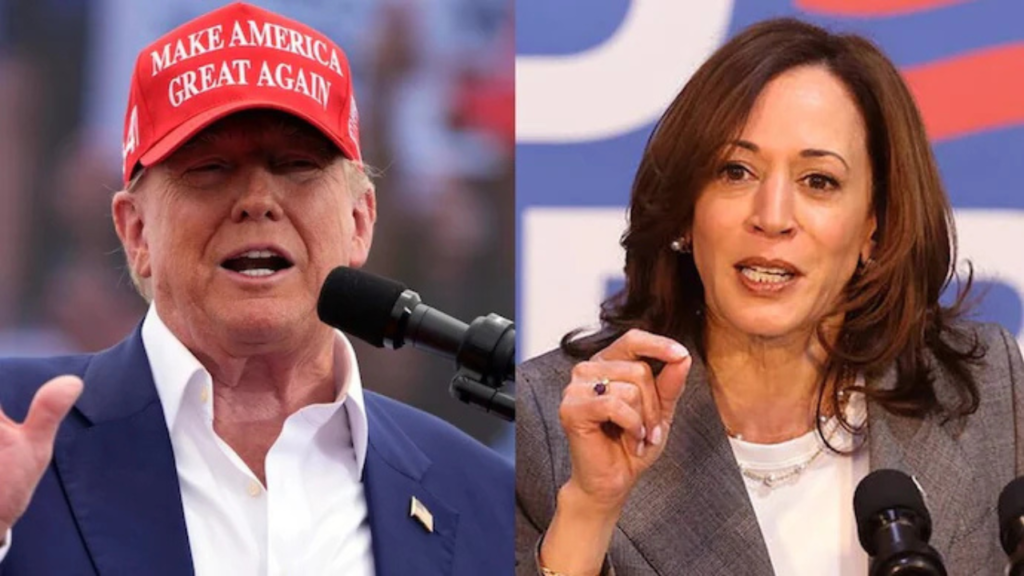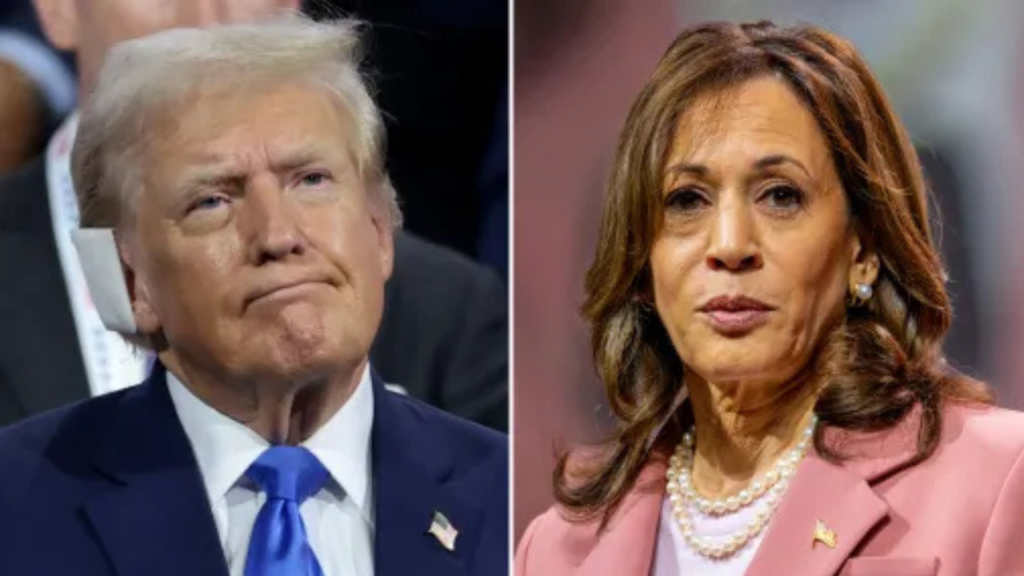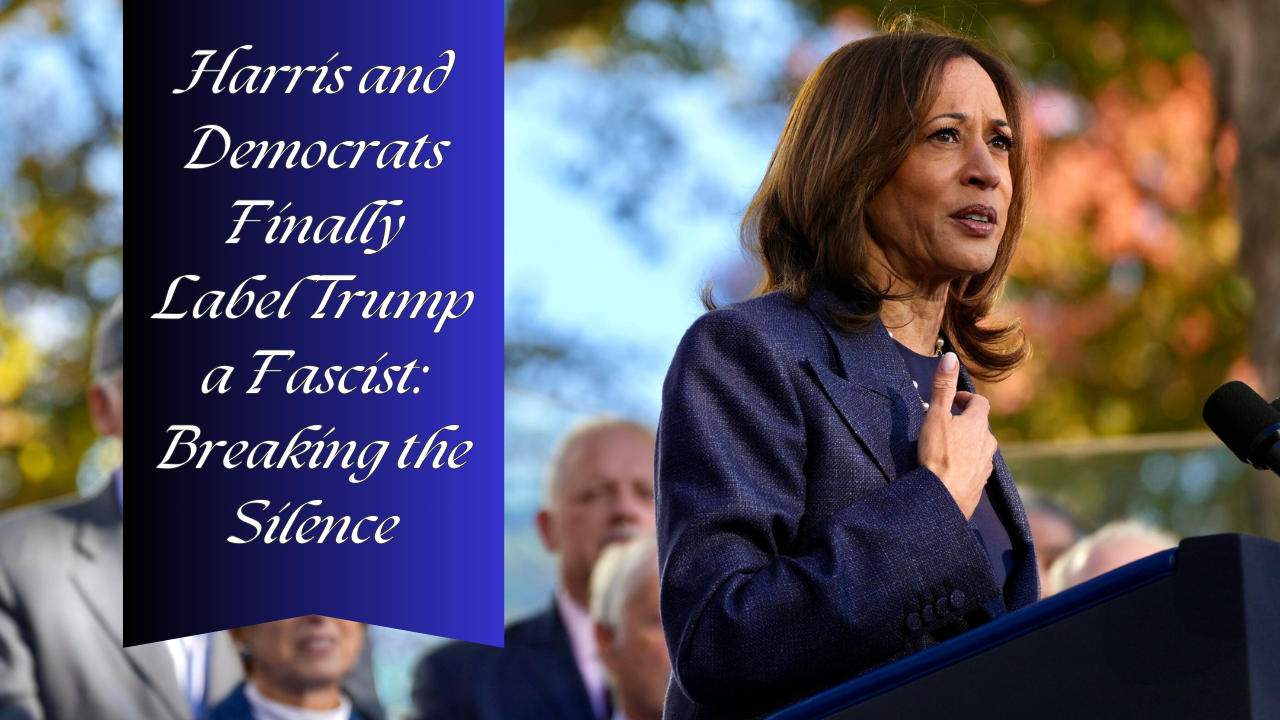A sea change in politics, Kamala Harris, Vice President and other top Democrats start speaking openly about the former US President Donald Trump as “fascist”, using the very word that many mainstream politicians avoided in the past.
This means that this new love for the word about Trump reflects a shift in how the Democrats view the risks of his political worldview but also in how they will counterattack him as he prepares to make a second bid for the White House in 2024.
The choice to designate Trump a fascist is significant, and its implications go far beyond hyperbole, with substantial consequences for the political situation in the United States.
The Reluctance to Use the F-Word
For years, Democrats have expressed worry about Trump’s behavior, policies, and rhetoric, frequently describing his acts as autocratic, divisive, and destructive to democracy. However, the term “fascist” has been widely avoided, even as Trump has embraced populist and nationalist views that many feel are hallmarks of fascism.

The name fascist has a huge historical load, conjuring memories of Mussolini, Hitler, and the tragedies of World War Two. To accuse someone of fascist implies a tendency to undermine democratic standards, repress minority groups, and consolidate power under a centralized authoritarian figure.
It is not a lightly used moniker, particularly in American politics, where the term has been perceived as too harsh for mainstream debate. And that has all changed with further developments. As Trump continues to campaign for 2024, the Democrats, lead by Kamala Harris, will not remain mute.
They brazenly stand in front of what they claim to be clear evidence that Trump is a fascist by spreading attacks on democratic institutions and sowing doubt in the voting process, among other things, while also giving more support to extreme groups.
What Changed? The January 6th Capitol Attack and Beyond
The attack on the Capitol on January 6th was a watershed moment in this shift in attitude. As protesters stormed the corridors of Congress in an attempt to change the 2020 presidential election results, pictures of violence, turmoil, and far-right extremism were impossible to ignore.
Trump’s failure to condemn the insurrectionists in a timely manner, combined with his continuous accusations of a “stolen election,” cemented in many people’s minds that he was no longer just a populist leader, but someone whose actions were consistent with fascist principles.
Following the events of January 6th, Democrats began to express grave worries about the existential threat Trump posed to democracy. While the term “fascism” was still used rarely, phrases like “authoritarian” and “anti-democratic” became prevalent in their criticisms of the former president.
But when Trump’s rhetoric reached another level of fanning and doubled down on the baseless claims of election fraud, Democrats began to reassess their strategy and believe that the time has come to confront Trumpism head-on and call it what they believe it is: fascism.
Kamala Harris Takes a Stand
Especially among them is Vice President Kamala Harris, one of the few willing to proclaim Trump a fascist. In a recent speech, Harris was frank that democracy is under threat and that what approaches Trump conceives are straight out of the authoritarian playbook. She did this breaking with prior Democratic traditions of caution; leaders avoided such a harsh word to create even more division.
Harris’s declaration that Trump is a fascist says much less about the quality of that rhetoric than it does about the strategic nature of that declaration-and that is because she happens to be the first woman of color and first female vice president of America who sees in the unusual dangers that Trumpism poses to underrepresented communities.
Throughout his presidency, Trump frequently targeted minorities, immigrants, and women, fanning racial tensions and advocating policies that exacerbated inequality. Harris’s forceful rhetoric indicates a desire to rally these groups and highlight the gravity of the threat they face if Trump returns to power.
Why Labeling Trump a Fascist Matters
Calling Trump a fascist is more than just name-calling or political rhetoric. It has significant consequences for how Democrats want to frame the 2024 race and the stakes for American democracy.
Democrats are establishing a clear line in the sand by using the term “fascist,” implying that the election is a war between democracy and authoritarianism, not just two political ideas. This framing has the ability to change how voters see Trump and his movement.

Many Americans remain wary of the notion that Trump poses an existential threat to democracy, seeing his populism as a valid political stance rather than a catastrophic departure from democratic norms. Using the term “fascism,” Democrats seek to raise awareness of the gravity of the issue and organize opposition to Trump’s campaign.
The Republican Response
Republicans and Trump’s backers have, predictably, dismissed the term “fascism” as bombastic and irrational. Trump has dismissed the claims, claiming they are part of Democrats’ long-standing conspiracy to discredit him.
There are some who feel that many Republicans really look at this new rhetoric by Democrats as a ploy to change the subject from their policy failures mostly on issues like inflation, immigration, and crime.
Yet at the same time, Republicans’ failure to denounce Trump’s most egregious acts, in the wake of January 6th alone, has heightened fears about the party’s readiness to cooperate with his authoritarian leanings.
While some Republicans have disavowed Trump, in significant measure since the Capitol melee, most Republicans continue to rally round him as he mounts a multiplicity of legal battles against a host of investigators and prosecutors.
The Fascist Playbook
So why do Democrats like Harris connect the dots between Trump’s actions and fascism? Critics claim that Trump embodies several fundamental aspects of fascism:
Erosion of Democracy: His frequent claims of election fraud, along with his refusal to concede the 2020 election, represent consistent efforts by Trump toward the erosion of trust in democratic institutions and in the credibility of elections.
Authoritarian Leadership: His admiration of strongmen such as Vladimir Putin, and his desire to have a monopoly on executive branch authority, are authoritarian tendencies to some extent reminiscent of the stance taken by past fascists.
Nationalism and Xenophobia: From the perspective of “America First,” Trump’s “immigration policies” and his language are rife with nationalist and xenophobic elements characteristic of fascism, often blaming or targeting minority groups to ferment fear and strife.
Cult of Personality: Fascist leaders usually acquire an extremely devoted, almost fanatical following wherein allegiance to the leader is given precedence before democratic principles. In this context, the manner in which Trump acquired an unapologetic base despite sundry legal issues and outrageous behavior he carried out.
Encouraging Violence: Trump’s unwillingness to completely condemn far-right extremist groups, his inflammatory rhetoric, and his dismissal of the January 6th violence all indicate a willingness to use or accept violence to achieve political aims.
What Comes Next?
As the 2024 presidential election approaches, Harris and the Democrats’ decision to label Trump a fascist is likely to exacerbate the country’s already polarizing political split. On the one hand, it will mobilize Democratic voters who think that Trump will threaten all their rights and liberties.
the other hand, it will alienate further voters for Trump and strengthen the perception of them that the Democrats have strayed out of touch from everyday Americans.

The problem for Democrats going ahead will be to balance their rhetoric in a way that emphasizes the gravity of the threat Trump poses while avoiding being regarded as hysterical. By adopting the term “fascism,” they are taking a calculated risk, which they believe is necessary to protect the integrity of American democracy.
Conclusion
Kamala Harris and the Democrats have opened a new chapter in the political war against Trumpism by labeling Donald Trump fascist.
is the period that saw them restrict their labeling of his conduct to authoritarian or anti-democratic behavior. Now they openly tie him to the rampaging politics of an ideology that history portrayed as dark and dangerous.
Whether this rhetorical move will resonate with voters or further expand the chasm of hate remains to be seen, but it means the stakes for the 2024 election are higher than ever. So far, so good, then, in this war for the future of American democracy. The difference between democracy and fascism has been made crystal clear.
FAQs:
1. Why are Harris and Democrats now calling Trump a fascist?
Harris and Democrats feel Trump’s activities, such as undermining elections and supporting authoritarianism, are consistent with fascist impulses, prompting them to finally use the phrase.
2. What events triggered the shift in rhetoric?
The Capitol attack on January 6th, combined with Trump’s persistent claims of election fraud, prompted Democrats to openly describe him as a fascist.
3. What are the key elements of fascism Democrats see in Trump?
Democrats see Trump’s undermining of democracy, authoritarianism, nationalism, and promoting violence as signs of fascism.
4. What impact could this have on future political discourse?
It may result in harsher political rhetoric, further exacerbating an already divided society.

